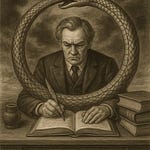Nominalism as Ideological Containment: Fear of Reality & Illusion of Freedom
The modern intellectual elite, believing themselves to be the inheritors of a long tradition of enlightenment and critical inquiry, rarely recognize that they are in fact operating within an engineered epistemic structure. They do not see nominalism as a historical imposition but as the inevitable outcome of human intellectual progress. To them, the rejection of realism is not a position to be debated but the foundation upon which all other inquiries must rest. This assumption, however, is itself the product of ideological containment.
Nominalism was not an organic discovery that emerged from rigorous inquiry into the nature of reality. It was a deliberate disruption, an ideological insertion designed to sever individuals from their ability to access reality directly. Generations have been taught, implicitly and explicitly, that all assertions of truth are expressions of power, that reality is a construct of human interpretation and that objectivity itself is an illusion maintained by those who seek control. This is not merely a philosophical position; it is a psychological conditioning mechanism that ensures the containment of thought within predefined limits. It’s also quite the example of DARVO in action.
When confronted with realism, the nominalist-trained mind does not engage in argumentation; it recoils. This is not because the arguments for realism are weak or unconvincing but because realism threatens the carefully curated intellectual framework upon which modern thought is built. The trained reaction is not to investigate realism but to dismiss it outright as a relic of authoritarianism, as a naive and simplistic failure to recognize the complexity of human cognition.
The greatest deception of nominalism is that it presents itself as a liberation from dogma when, in fact, it is the most refined and insidious form of epistemic control ever devised. Unlike overt censorship, which creates martyrs and resistance, nominalism achieves its goal by embedding itself so deeply into language, education, and discourse that alternatives become literally unthinkable. It does not need to suppress realism directly because it has trained individuals to reject it as a matter of intellectual hygiene. The individual who encounters realism does not argue against it; he experiences it as an assault on his entire mode of understanding. This is why mere debate is ineffective in breaking nominalist containment. One cannot simply tell a nominalist that reality is objective, because his training has ensured that he does not even possess the conceptual framework necessary to process such a claim.
The rejection of realism, however, is not merely a conditioned response. It is also a psychological defence mechanism. To accept realism is to accept responsibility. If reality is objective, then truth is not something one creates but something one must align oneself with. This demands intellectual and moral discipline, as well as the courage to abandon comforting illusions. Nominalism, in contrast, offers the illusion of freedom. It allows individuals to believe that they can redefine morality, identity, and even truth itself to suit their own desires. It provides an escape from the weight of objective reality by presenting truth as a fluid construct, infinitely malleable and always subject to reinterpretation. This is not freedom but a trap, for in a world where truth is subjective, those who wield institutional power determine what is real.
The nominalist believes he is free because he has been granted the ability to “construct” his own understanding of reality. In truth, he is merely navigating a predetermined range of acceptable narratives, each of which serves the interests of the containment structure. He does not perceive this because he has been conditioned to see all alternatives as regressions into dogmatism and oppression. This ensures that even the most intelligent and critical minds remain prisoners of a system that convinces them they are free. They do not see that they have been trained not to recognize their own chains.
The consequences of this epistemic containment are profound. A society that cannot access reality directly cannot govern itself. It cannot establish justice, because justice requires an objective standard beyond subjective interpretation. It cannot sustain liberty, because liberty presupposes a moral order that transcends social constructs. It cannot produce genuine knowledge, because knowledge requires correspondence with an external reality, not merely coherence within an internally constructed framework. A civilization that embraces nominalism will ultimately find itself ruled not by reason, but by power, for in the absence of truth, force becomes the final arbiter of what is real.
To dismantle this containment, it is not enough to argue for realism. The nominalist-trained mind will dismiss such arguments before they are even processed. Instead, the containment system itself must be exposed. He must see that his own instincts, observations, and interactions with the world are grounded in realism, even as he has been trained to deny it intellectually.
Nominalism’s greatest weakness is that it is a parasitic framework. It cannot sustain itself on its own. It survives only by hijacking the structures of realism while simultaneously denying their legitimacy. Once this contradiction is made visible, the entire edifice begins to crumble. The nominalist can deny realism in theory, but he cannot escape it in practice. He may claim that truth is subjective, but he still expects his bridges to hold, his medicine to work and his contracts to be honoured. He may argue that morality is a social construct, but he still demands justice when wronged. He may insist that knowledge is a linguistic convention, but he still believes his own arguments should be understood as meaningful and true.
Breaking the containment is only the first step. The deeper task is to rebuild an intellectual culture that does not merely accept realism as a theoretical position but recognizes it as the necessary foundation for human flourishing. This requires restoring the disciplines of reason, ethics and governance that have been systematically dismantled by centuries of nominalist infiltration. It demands that individuals take responsibility not only for their own intellectual formation (self governance) but for the preservation of a civilization that can once again recognize truth, defend liberty and uphold justice.
The transition from nominalism to realism is not merely an academic exercise. It is the prerequisite for restoring the conditions necessary for genuine self-governance and sovereignty. Without it, individuals will remain trapped within a system that convinces them they are free while ensuring that they can never truly think, act, or live outside of the structures imposed upon them. The real task, then, is not simply to debate nominalism but to awaken individuals to the reality that they have been conditioned to deny their own perception, their own reasoning and ultimately, their own capacity to recognize and align themselves with truth.
The destruction of realism was not an accident. It was not an inevitable evolution of thought. It was a deliberate infection; a carefully engineered subversion designed to unmoor entire civilizations from reality. The Fools facilitated the disease, believing they were advancing knowledge, while the Knaves used that blindness to seize power. The only path to restoration is to reclaim what was lost; not merely by understanding what happened, but by rebuilding the very foundation that was erased.












